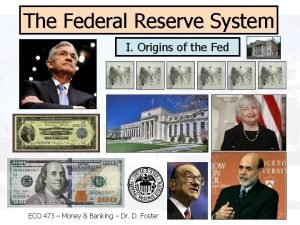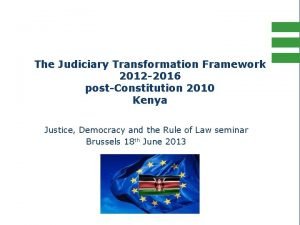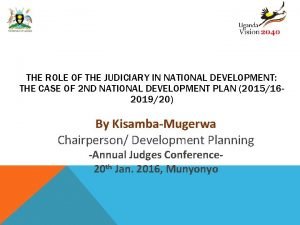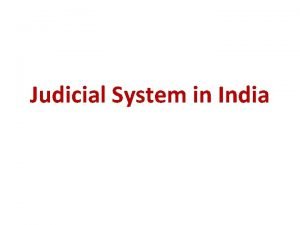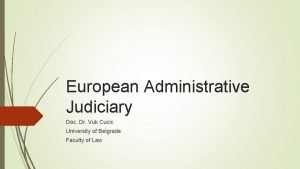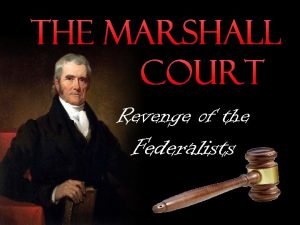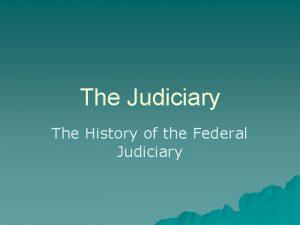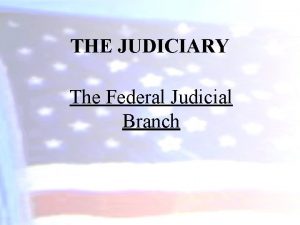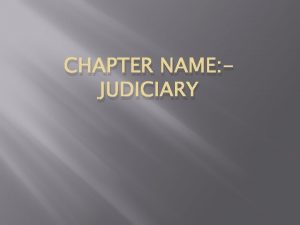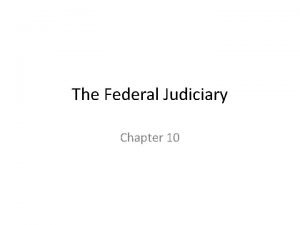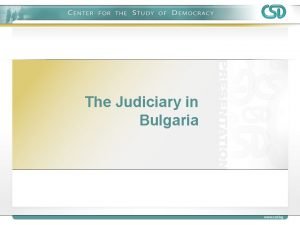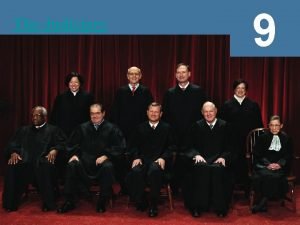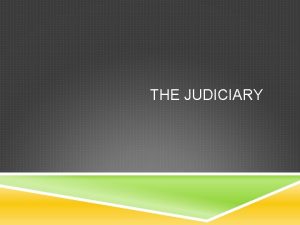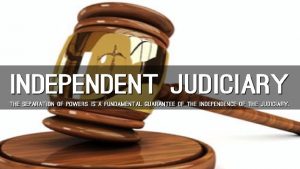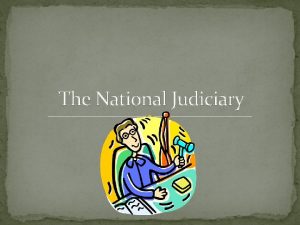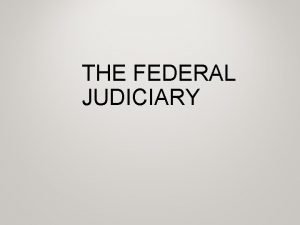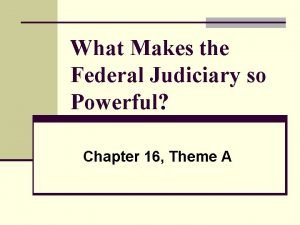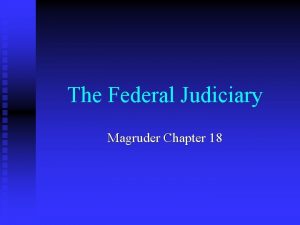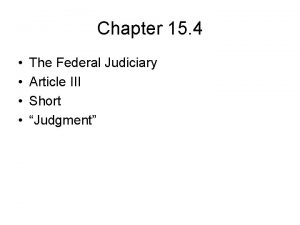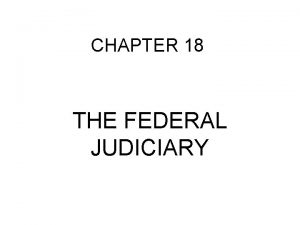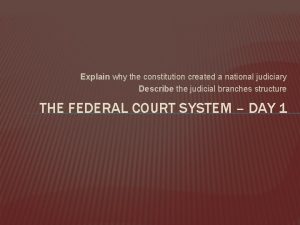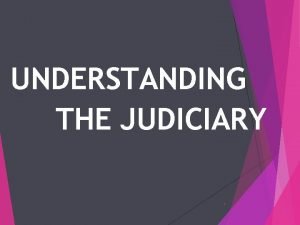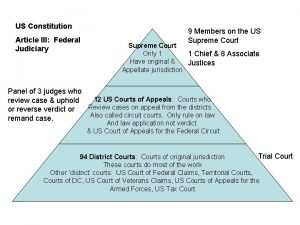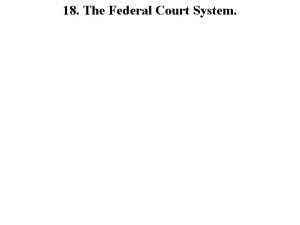Chapter 15 The Judiciary 1 Federal Judiciary Created







![Judicial Selection: Nomination of Robert Bork [Sec. 15. 3] He was nominated by Ronald Judicial Selection: Nomination of Robert Bork [Sec. 15. 3] He was nominated by Ronald](https://slidetodoc.com/presentation_image_h2/a5ebed628655e7e208e58377303191a7/image-8.jpg)

![Judicial Selection: Nomination of Clarence Thomas [Sec. 15. 3] 10 Judicial Selection: Nomination of Clarence Thomas [Sec. 15. 3] 10](https://slidetodoc.com/presentation_image_h2/a5ebed628655e7e208e58377303191a7/image-10.jpg)











![Justice Scalia: [There's] the argument of flexibility and it goes something like this: The Justice Scalia: [There's] the argument of flexibility and it goes something like this: The](https://slidetodoc.com/presentation_image_h2/a5ebed628655e7e208e58377303191a7/image-22.jpg)

![How cases get to the Court [Sec. 15. 5] File a petition—most cases are How cases get to the Court [Sec. 15. 5] File a petition—most cases are](https://slidetodoc.com/presentation_image_h2/a5ebed628655e7e208e58377303191a7/image-24.jpg)

![Judicial Review [Sec. 15. 6] Marbury v. Madison (1803) ◦ The Court gave itself Judicial Review [Sec. 15. 6] Marbury v. Madison (1803) ◦ The Court gave itself](https://slidetodoc.com/presentation_image_h2/a5ebed628655e7e208e58377303191a7/image-26.jpg)

- Slides: 27

Chapter 15 The Judiciary 1

Federal Judiciary Created by Article III Only the Supreme Court is specifically created by the Constitution “Inferior” Courts are created by congress District Courts Appeals Court (Care to draw a diagram? Numbers will help you. ) 2

Standing, Sovereign Immunity, Class Action Suits (Sec. 15. 1) Standing ◦ The right to bring a case to court Sovereign immunity—the government is protected from law suits unless it allows itself to be sued ◦ Ex. Negligence Class action suit—when anyone in the same situation is allowed to become a plaintiff in the suit ◦ Ex. Brown v. Board of Education ◦ BPS parents in law suit from 2016; costs for class 3

Sec. 15. 2 The Federal Court System See p. 445 ◦ District Court—original jurisdiction Almost all federal cases begin here There are 94 District Courts only federal court with a jury ◦ Court of Appeals—appellate jurisdiction There are 12 Appeals courts appeals are heard by a panel of 3 to 5 judges ◦ Supreme Court – 9 judges hear the case Appellate jurisdiction and original jurisdiction for some specialized cases 4

This: Federal Distrcit Courthouse US Federal District Court, Eastern District of Michigan 5

Breakdown of Federal District Court Michigan 6

46 th District Court Southfield - State of Michigan Court System 7
![Judicial Selection Nomination of Robert Bork Sec 15 3 He was nominated by Ronald Judicial Selection: Nomination of Robert Bork [Sec. 15. 3] He was nominated by Ronald](https://slidetodoc.com/presentation_image_h2/a5ebed628655e7e208e58377303191a7/image-8.jpg)
Judicial Selection: Nomination of Robert Bork [Sec. 15. 3] He was nominated by Ronald Reagan and rejected by the Senate because of his judicial philosophy. His was a “strict constructionist. ” It is rare for a nominee to be rejected. They usually ask their name to be withdrawn if rejection is imminent. “There is no constitutional right to privacy!” 8

Ted Kennedy led the opposition to Robert Bork with this speech on the Senate floor “Robert Bork’s America is a land in which women would be forced into back-alley abortions, blacks would sit at segregated lunch counters, rogue police could break down citizens’ doors in midnight raids, schoolchildren could not be taught about evolution, writers and artists could be censored at the whim of the government. ” 9
![Judicial Selection Nomination of Clarence Thomas Sec 15 3 10 Judicial Selection: Nomination of Clarence Thomas [Sec. 15. 3] 10](https://slidetodoc.com/presentation_image_h2/a5ebed628655e7e208e58377303191a7/image-10.jpg)
Judicial Selection: Nomination of Clarence Thomas [Sec. 15. 3] 10

What Thomas said in his Senate confirmation hearings: “This is a circus. It's a national disgrace. And from my standpoint, as a black American, it is a high-tech lynching for uppity blacks who in any way deign to think for themselves. … You will be lynched, destroyed, caricatured by a committee of the U. S. Senate rather than hung from a tree. ” (His implication is the accusations were based on his race 11

The Recent Events of The Supreme Court vacancy: 12

Republican Senators refused to meet. 13

14

April 12, 2018 15

16

17

NY Times Video Highlights of Ford & Kavanaugh Hearings: 18

You need your book today & tomorrow! 19

Day 3: (? ) A few notes that cover the homework topics discuss homework and answer any questions Listen to Schuette v. Bamn oral arguments from the Supreme Court for about 10 minutes Wednesday: Stare Decisis work ? This Thursday/Friday : ◦ Vocab quiz on Judiciary 20

Judicial Philosophies Strict Constructionist/Originalism/Judicial Restraint ◦ Apply legal doctrine /rules clearly stated or clearly implied by the Constitution ◦ The courts should defer to state governments if the law was fairly passed. Justices Thomas & Alito most closely associated with this position today. 21
![Justice Scalia Theres the argument of flexibility and it goes something like this The Justice Scalia: [There's] the argument of flexibility and it goes something like this: The](https://slidetodoc.com/presentation_image_h2/a5ebed628655e7e208e58377303191a7/image-22.jpg)
Justice Scalia: [There's] the argument of flexibility and it goes something like this: The Constitution is over 200 years old and societies change. It has to change with society, like a living organism, or it will become brittle and break. But you would have to be an idiot to believe that; the Constitution is not a living organism; it is a legal document. It says something and doesn't say other things. Speech to the Federalist Society, 2006. 22

Activist Approach ◦ Discover underlying principles and apply them using modern social, political, economic theories Current Justice Steven Breyer is generally considered a judicial activist. 23
![How cases get to the Court Sec 15 5 File a petitionmost cases are How cases get to the Court [Sec. 15. 5] File a petition—most cases are](https://slidetodoc.com/presentation_image_h2/a5ebed628655e7e208e58377303191a7/image-24.jpg)
How cases get to the Court [Sec. 15. 5] File a petition—most cases are rejected ◦ There are thousands filed each year “Rule of 4”—Four justices must decide to accept the case ◦ The court issues a “writ of certiorari” Legal briefs are sent up to the Supreme Court ◦ All court documents and written arguments 24

Process in the Court Oral arguments are scheduled and held in front of the 9 justices ◦ Usually 30 minutes for each—plaintiff/defendant ◦ Justices ask interrupt and ask questions Clarify arguments A way of calling attention to a particular issue Justices hold a “conference” A justice is picked to write the opinion Over the term the opinion is written ◦ All opinions are released by the end of June 25
![Judicial Review Sec 15 6 Marbury v Madison 1803 The Court gave itself Judicial Review [Sec. 15. 6] Marbury v. Madison (1803) ◦ The Court gave itself](https://slidetodoc.com/presentation_image_h2/a5ebed628655e7e208e58377303191a7/image-26.jpg)
Judicial Review [Sec. 15. 6] Marbury v. Madison (1803) ◦ The Court gave itself the power of Judicial Review The power of the federal court to decided if laws and acts of the Executive violate the Constitution 26

Litmus Test The Senate Judiciary Committee must approve all nominations to the Court Litmus test is a way for the Senate to find out a nominee’s ideology ◦ ◦ Questions asked on “wedge issues” Souter—would not disclose Thomas— “I have not formed an opinion yet. . . ” He was accused of sexually harassing a female coworker. 27
 Federal reserve system
Federal reserve system Judicial transformation framework
Judicial transformation framework Judicial activism vs restraint
Judicial activism vs restraint Cohesive society and preserved identity
Cohesive society and preserved identity Department of judiciary
Department of judiciary 3 types of courts in india
3 types of courts in india Judiciary
Judiciary Whats the judiciary act
Whats the judiciary act Hát kết hợp bộ gõ cơ thể
Hát kết hợp bộ gõ cơ thể Bổ thể
Bổ thể Tỉ lệ cơ thể trẻ em
Tỉ lệ cơ thể trẻ em Voi kéo gỗ như thế nào
Voi kéo gỗ như thế nào Chụp phim tư thế worms-breton
Chụp phim tư thế worms-breton Chúa yêu trần thế
Chúa yêu trần thế Môn thể thao bắt đầu bằng từ chạy
Môn thể thao bắt đầu bằng từ chạy Thế nào là hệ số cao nhất
Thế nào là hệ số cao nhất Các châu lục và đại dương trên thế giới
Các châu lục và đại dương trên thế giới Công của trọng lực
Công của trọng lực Trời xanh đây là của chúng ta thể thơ
Trời xanh đây là của chúng ta thể thơ Cách giải mật thư tọa độ
Cách giải mật thư tọa độ 101012 bằng
101012 bằng Phản ứng thế ankan
Phản ứng thế ankan Các châu lục và đại dương trên thế giới
Các châu lục và đại dương trên thế giới Thể thơ truyền thống
Thể thơ truyền thống Quá trình desamine hóa có thể tạo ra
Quá trình desamine hóa có thể tạo ra Một số thể thơ truyền thống
Một số thể thơ truyền thống Cái miệng nó xinh thế
Cái miệng nó xinh thế
